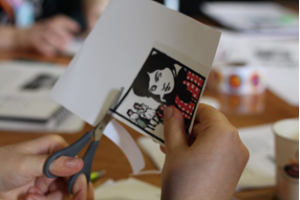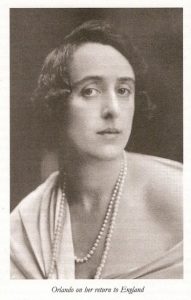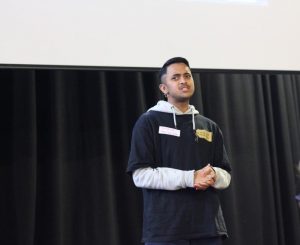The third workshop of the ‘Transformations’ series was dedicated to the topic of stories and narratives. We tackled broad questions about the ways in which scripts can be used to represent sexual and gender identities in different contexts, how some scripts confine us whereas others allow us important opportunities to express ourselves.
We began with an activity which explored the clichés regarding trans identity and asked ourselves, and each other, how and why these exist in the world. This opened up an interesting conversation in which the participants contributed ideas about how certain prescriptive scripts and gendered social norms are perpetuated through popular culture; for example, films, books, TV, and newspaper articles. 
These interesting conversations were intertwined with the historical material to which the young participants were introduced. We had a session on Harry Benjamin – an endocrinologist and sexologist who worked with trans people and sought to advance transgender treatments in the 1950s and 1960s.  We looked at the way in which Benjamin’s work also created a very rigid script about what it means to be trans, and who is ‘eligible’ for medical treatment. We discussed the continued impact of this script on the trans community today. We looked at cut up and repurposed print outs of the ‘Benjamin Scale’ – a framework which assessed ‘sex and gender role disorientation and indecision’ and separated trans people into ‘types’ with differing characteristics or ‘indicators’ on a sliding scale.
We looked at the way in which Benjamin’s work also created a very rigid script about what it means to be trans, and who is ‘eligible’ for medical treatment. We discussed the continued impact of this script on the trans community today. We looked at cut up and repurposed print outs of the ‘Benjamin Scale’ – a framework which assessed ‘sex and gender role disorientation and indecision’ and separated trans people into ‘types’ with differing characteristics or ‘indicators’ on a sliding scale. 
This led to interesting conversations about performativity, and the pressures some trans women feel to be visibly and conventionally feminine to pass ‘successfully’. We also discussed the ways in which many trans men develop strategies for ‘passing’ that are connected with ideas of invisibility, and the lack of an ‘overly showy’ performance.
In the second half of the workshop, we explored gender rebels from the past who deliberately broken with conventional scripts around gender and sexuality. We engaged with visual material and various quotes to discuss Orlando, a novel written by Virginia Woolf in 1928 – it is a playful biography of Vita Sackville-West, an upper-class author who identified as both masculine and feminine. Sackville-West was married to a man and had many relationships with women, including a love affair with Woolf herself that inspired Orlando. After exploring the text and some key quotes, we discussed the possibility and value of understanding both Orlando and Sackville-West using today’s terms, such as genderqueer or non-binary, merging the historical with the contemporary. Looking at some of Sackville-West’s own quotes about their identity, we were struck by the bold articulation of their own non-binary identity. The confidence and explicit nature of the narratives that are over 100 years old were unexpected and fascinating.  We also explored the autobiography A Man’s Maiden Years (1907), which was written by Karl M. (=Martha) Baer, who wrote under the pseudonym, N. O. Body, to keep his identity private. This again sparked conversations about the significance of naming and names. Karl was born in 1884, assigned female at birth, and was raised as Nora Body. In his autobiography, he tells the story of how he knew himself to be a man and transitioned to become Norbert Body in his early 20s.
We also explored the autobiography A Man’s Maiden Years (1907), which was written by Karl M. (=Martha) Baer, who wrote under the pseudonym, N. O. Body, to keep his identity private. This again sparked conversations about the significance of naming and names. Karl was born in 1884, assigned female at birth, and was raised as Nora Body. In his autobiography, he tells the story of how he knew himself to be a man and transitioned to become Norbert Body in his early 20s. 
This led to an exploration of the significance of defining oneself, and how identification might change across one’s lifetime. We explored Baer’s decision to keep his “dead name”, Martha. We considered why he might have wanted to do this, and how he exercised the power to choose his name. Further reflections on the politics of keeping or changing names, considered the importance of context and space in which a name is used. For example, we suggested that some people needed to keep their names for professional reasons; the professional world thus becomes a place where one’s identity is related to their qualifications and so need to remain recognisable. We once again got creative and made fun collages that imagined a movie poster or book cover for a particular gender rebel or group of gender rebels. 
The amazing speakers for this workshop were Krishna Istha, a live artist and theatre-maker, and Kate O’Donnell, the artist and theatre-maker behind TransCreativeUk. Krishna and Kate told us about their performance work, which includes stories about gender identities. The speakers then joined the young people for the creative activities and more discussion around clichés and expectations about trans lives, and the ways in which certain ‘scripts’ have a significant part to play in this. 

